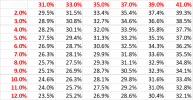I tend to think this is more likely to be due to lobbying from the industry than anything else, this isn't the first time they've raised the issue. That being said, you would also hope there is also greater realisation of the need to entice people to invest for the long term to provide sufficient income later in life, and how out-of-sync Ireland is on taxation of investments compared to our European peers/competition.
My own view on this area is that the rules and guidelines originally evolved in a world where there was a need to prevent Irish high net worth individuals rolling up income in structures like Luxembourg-incorporated limited liability companies (SICAVs), Channel Islands structures etc prior to the onset of the now commonplace ETFs and the like.
The financial world has moved on and there are all sorts of fund investments available to the man on the street. The area of fund taxation is far too arcane as a result of these rules and does not serve the Irish taxpayer well.
An Irish investor should not have to employ a tax adviser to dig into the prospectus of each individual fund to determine if an investment is taxed under fund rules or general tax principles. Or at least if it's an esoteric investment that an ultra high net worth investor is considering structuring, then yes, but not for garden-variety stock exchange listed products where the investor has no say in the investment decisions etc.
There should be a single CGT, DIRT, Funds tax rate.
There should be similar tax treatment on death for shares and funds.
There should be similar loss treatment for shares and funds.
There should be similar remittance basis of taxation treatment for shares and funds.
I would say that the rules create a needless rod for Revenue's back given the amount of queries and uncertainty they create, but it's more a rod for the Irish taxpayer's back trying to navigate this area.
Hopefully some common sense will prevail in the review into this area mentioned in the article referred to earlier.

